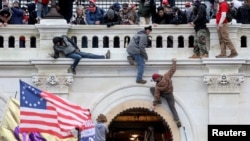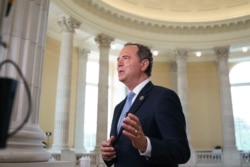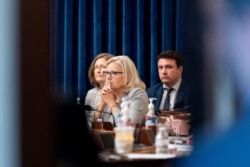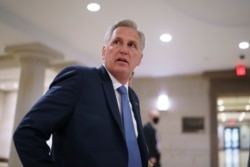Law enforcement officers who defended the U.S. Capitol were first to testify as hearings began Tuesday for the House Select Committee to Investigate the January 6th Attack.
The existence of the committee and its membership is widening the political split between Republicans and Democrats.
Democrats originally proposed an independent commission based on the success of the commission that delivered a widely accepted investigation into the September 11, 2001, terror attacks on the U.S.
"The commission was going to be a body with much more clout," said political scientist Norm Ornstein, a senior fellow emeritus at the American Enterprise Institute.
A group of Democrats and Republicans in the House of Representatives came up with a plan for an independent commission. There was agreement on many Republican requests. There would be an equal number of Democrats and Republicans on the commission and an end-of-year deadline for the final report. In mid-May, it passed the House 252-175, with 35 Republicans voting for the commission.
Commission vs. committee
Since a commission would have to be approved by both chambers of Congress and signed into law by the president, it would likely have more clout to conduct its investigation.
"(A commission) would have been able to get more muscle in terms of its ability to get witnesses and the important information out there. They might have been able, for example, to enlist the Justice Department as an independent commission. So that would have been preferable," said Ornstein.
But by the end of May, Senate Republicans blocked a vote, killing the commission.
At the end of June, Speaker Nancy Pelosi, a Democrat, went to the floor of the House of Representatives to propose a select committee to investigate.
"It will operate basically like any other committee in the House," explained Ornstein. "They'll have subpoena authority … and that means they'll have the ability at least in theory to require or compel witnesses to come in," Ornstein said.
Republicans accused Democrats of wanting a predetermined outcome, but the House authorized the new select committee. Just two Republicans voted for it.
Selection showdown
Eight of the 13 committee members were to be appointed by Pelosi, who chose seven Democrats and Republican Liz Cheney, who was ousted from her party's leadership post because of her open defiance of the false narrative touted by President Trump that the 2020 election had been stolen from him.
"Some of the other Republicans who have been outspoken on this are under enormous pressure from within their own party not to participate. It takes a great deal of courage, which Liz Cheney has shown, to go against your party and your party leader."
As the minority party leader, Republican Kevin McCarthy was allowed five committee selections. Pelosi rejected two of them: Jim Jordan of Ohio and Jim Banks of Indiana. Jordan has been a vocal supporter of Trump's false narrative. Banks said he would use his committee post to examine racial justice protests last summer. Both voted to overturn the election results in Congress.
"They had made statements and taken actions that I think would impact the integrity of the commission of the committee, the work of the committee," Pelosi explained Thursday.
McCarthy shot back that "Pelosi has created a sham process. Unless Speaker Pelosi reverses course and seats all five Republicans, we will not participate."
McCarthy could be a possible witness for the committee to find out more about his January 6 phone call to then-President Trump, purportedly imploring the president to call off his supporters attacking the Capitol.
"He does not want to testify, and he does not want others to show that he challenged Trump and got rebuffed," Ornstein explained. "And then you have a question of whether (Congress) can hold their own members, including the leader of one party, in contempt," Ornstein added.
Pelosi appointed a second Republican, Adam Kinzinger, to the panel on Monday. He and Cheney were only Republicans to vote with Democrats to create the committee to investigate the attack. McCarthy called them "Pelosi Republicans."










